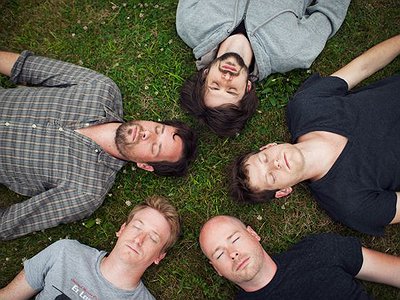The interview was conducted with Caspian guitarist Philip Jamieson.
When did you start writing/producing music - and what or who were your early passions and influences?
I started writing music in my early college days, when I was around 18 years old. My earliest major influence was Jimmy Page and his work with Led Zeppelin, without question.
What do you personally consider to be the incisive moments in your artistic work and/or career?
I learn something new and valuable during the writing, recording and production of every one of our albums. There is always more to learn and discover, though with Waking Season I feel like I learned more than any other experience combined thus far. It was a very emotionally exhausting and mentally demanding time assembling this record and I feel like my ear benefited from it substantially in the end.
What are currently your main compositional- and production-challenges?
We are always trying to capture the raw energy that you experience from a live show into the studio environment without compromising the possibilities offered in the nuances of a recording process.
What do you usually start with when working on a new piece?
I always start a piece alone in my own small studio, usually just by playing the guitar and creating loops and other patterns and then pulling out a nice melody or chord structure from the rubble and take it from there. It's always different but that's the general process.
How strictly do you separate improvising and composing?
Great question. Sometimes I'm not sure what the main difference is between the two as composing to me involves a multitude of different elements all working together towards the formation of a piece. I don't approach the distinction dogmatically at all. Whatever works for whatever atmosphere I'm trying to create, is how I roll with the process.
How do you see the relationship between sound, space and composition?
They are disparate elements that need to exist in harmony with one another. Lately I have been fascinated by the concept of space and allowing progressions and melodies to breathe easier and remain as emotional anchors for longer than I would have in the past. Trying to develop a true sense of patience structurally, means that I have to always be digging for ways to allow these elements to exist in harmony.
Do you feel it important that an audience is able to deduct the processes and ideas behind a work purely on the basis of the music? If so, how do you make them transparent?
I am more into the concept of subjectivity and allowing the audience to deduce whatever their mind can imagine in regards to experiencing a piece of music, whether it be from an assumed compositional perspective or process, or the imagery that it creates for them visually. I would hope people bring whatever they want to the table in terms of their inferences, it keeps things more exciting and mysterious.
In how much, do you feel, are creative decisions shaped by cultural differences – and in how much, vice versa, is the perception of sound influenced by cultural differences?
Another great question, and one that I'm still trying to develop a sufficient answer to. Geographically I think people's locations definitely factor into what they create and how they perceive sound, without a doubt. Living on the ocean I can testify to that directly. Culturally maybe in more communal environments people are subconsciously encouraged to create more collaboratively. In contrast, the individualist society of the United States probably has a lot to do with the existence and widespread success of solo-act pop icons.
The relationship between music and other forms of art – painting, video art and cinema most importantly - has become increasingly important. How do you see this relationship yourself and in how far, do you feel, does music relate to other senses than hearing alone?
I know that personally I am inspired far more by visual mediums such as film, photography, design and fine art when it comes to creating music than actual music itself. Music is the melodic, sonic expression of visual shape and form to me in many ways and always has been, which is one of the main psychological reasons it has such sweeping power and force.



